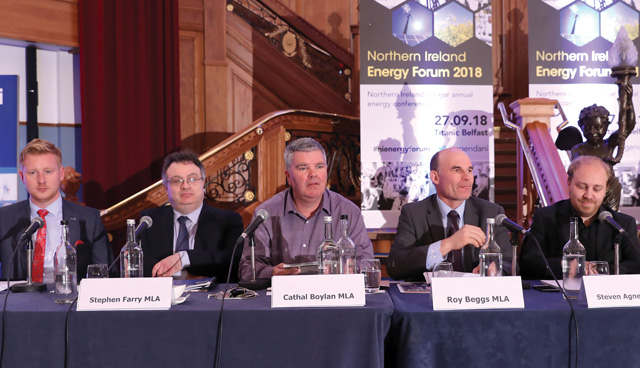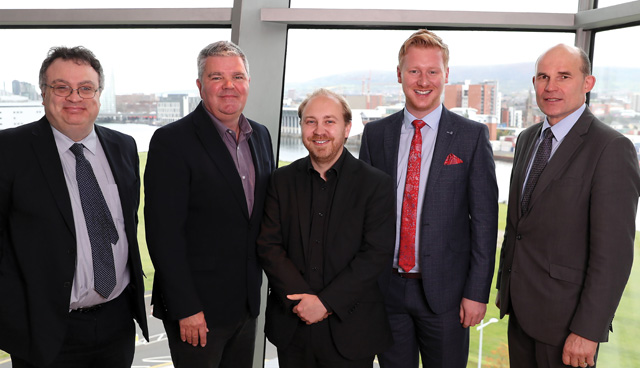Energy: challenges, policies and priorities

MLAs of most of Northern Ireland’s main political parties participated in a panel discussion on the challenges around energy policy at this year’s Northern Ireland Energy Forum.
Provide a brief outline of your party’s policy on energy.
Steven Agnew
There are three key elements to the Green Party’s strategy on energy. I’m very keen to emphasise that we need to decarbonise and democratise, with the vision of each home in the country becoming a power station in and of itself. This may present challenges to NIE, but regardless, we believe this to be the best approach. To decarbonise and democratise we must plan. Firstly, we had the I-SEM, now we need an International Strategic Energy Framework (ISEF). The Strategic Energy Framework was a single department document, and it was ambitious, however it must be replaced with cross-departmental policy. We can’t talk about decarbonisation without talking about agriculture and transport, nor can we forget about housing. We need an all-government, cross-departmental decarbonisation plan to follow on from
I-SEM. The energy transition must be managed with consumers and workers at the heart of any plan.
Roy Beggs
I represent East Antrim, where we have Ballylumford and Kilroot. I would firstly argue that there is no point having energy policy unless we have the means to implement it. That means that we need a government in Stormont, making decisions. There are major planning decisions which aren’t being taken. One of the concerns that I have is that Kilroot has been deemed unnecessary, an issue complicated further by Brexit. I am concerned that such a decision would threaten the stability of energy supply. In terms of general energy, it’s all about balance. We need to look after the environment, as well as efficiency, market competition and the security of supply.
Cathal Boylan
Sinn Féin has worked with many energy stakeholders to move the North of Ireland from fossil fuel dependency to a renewable energy portfolio. We are proud to put forward a 12-measure document after seeking the input of experts working across the field of energy and renewables, and we shall continue to seek the guidance of experts as we continue towards our 2030 goals outlined at the Paris conference. Brexit will impact all of Ireland, and we must work in partnership with each other.
Stephen Farry
There are three key elements to our party’s approach to energy. The first is that we have competitive benefits, both to consumers and businesses. Our energy infrastructure is a key component, and we must invest to ensure that Northern Ireland appears as a good place to grow a business and to encourage more foreign direct investment. The second issue surrounds the security of supply, and current proposals for an interconnector are significant and must proceed as quickly as possible. Thirdly, we must promote renewables as part of a comprehensive energy strategy across Northern Ireland. We must beware of Brexit and its implications on I-SEM and maintaining the future security of supply is vital.
Daniel McCrossan
One of our biggest concerns is the uncertainty brought by Brexit, and what will happen to Ireland’s energy supply after that point. The question of security of supply is one which is growing as time goes on. There are huge concerns as to whether the lights will be on or off after 2021. In the absence of a government, we must ensure that there is a clear plan in place. It is the view of the SDLP that the integrity of Ireland’s energy supply must be protected post-Brexit. It must also be made affordable to consumers and business owners.
Is there an impetus on politicians to explore potential infrastructure for the energy sector?
Cathal Boylan
Absolutely, and the issue lies with the current legal system we operate in. We all know the judge’s decision, and we don’t have a Minister to implement decisions…
Stephen Farry
I think that’s a cop out. You talk about the constraint of legal systems, however, Sinn Féin have a policy of putting it underground. That is not commercially viable. If we have an interconnector, it must be overhead. We must recognise that the most advanced area of economic cooperation that has happened in Northern Ireland over the past 10 years has been energy. The implications of not having an Executive can’t just be swept under the carpet. We see the issue of civil servants and what decision-making powers they have, and this reared its head with the interconnector and the Hightown incinerator. We will constantly be playing catch-up for the next 10 years, unless we act.

Steven Agnew
Transition must be informed by evidence and expertise, and we do have issues that predate the collapse of the Assembly. We must educate on the benefits of renewables and a truly decarbonised society, and those in government must be stepping forward to take the right decisions. That’s what being in government is about.
Roy Beggs
There is a lot of focus on cost-effectiveness, and rightly so. We must keep costs as low as possible for both businesses and consumers. The moment when we hit difficulties, we will immediately look to security of supply. The fact that the interconnector isn’t being built, combined with the current halt in planning decisions will lead to huge difficulties in later years. Whilst the pursuit of renewable energies is extremely important, we must not lose focus on the security of supply.
How does your party plan to tackle fuel poverty?
Steven Agnew
We had a road map in terms of a Green New Deal, and unfortunately that didn’t get approval from the Government. We need to consider new housing and energy efficiency as part of any infrastructure. Unfortunately, we have more winter excess deaths than Finland, whose temperature can be known to drop below 30 degrees. All houses in Finland have cavity wall and underfloor insolation and at least double glazing. We need to take on that challenge and balance between business, environmental groups and trade unions. The roadmap is there and we need to get on with it, whether that is boiler replacement schemes or double glazing investment. We need one plan and we need to review all of the housing stock in Northern Ireland to ensure energy efficiency – it is not right that fuel poverty exists in the current age of technology. We must say that renewable energies are welcome in Northern Ireland. Had we been listened to 10 years ago, we would be in a much better place.
Roy Beggs
Energy is in an upwards-cost direction, and energy efficiency must be improved, especially in our housing stock. The Housing Executive can’t allocate any funds or resources to do this at present, and this must be changed. We must also remember that fuel poverty also affects many in the private sector, meaning that further resources must be set aside.
Cathal Boylan
Housing should be built to the highest efficiency possible. We must take advantage of the opportunities granted by alternative energy sources such as solar. In terms of funding, the pot for energy and renewable sources is one of the smallest. We must review the eligibility criteria to encourage more people to fall within that bracket.
Stephen Farry
On the affordability issue, misspending is not just seen in energy, it is seen across other departments such as health. To support energy efficiency, we must see more appropriate spending across the board.
We must also face the fact that household taxes in Northern Ireland are considerably lower than other places in the UK. It is a difficult conversation to have, and people certainly won’t want to invest more money in an inefficient Stormont. So, we must make the case for decent pay, as well as for water charging.
Daniel McCrossan
My constituency is one of the worst-affected areas in terms of fuel poverty. Day and daily we see just how much people are struggling and faced with the familiar choice of ‘heat or eat’. The other panellists are correct in saying that we can empower the Housing Executive to change the situation through more adequate funding. What we have found helpful is the Warm a Home Scheme, which encourages people to maximise energy efficiency. Investment is an absolute must, as is dialogue between local authorities on any energy strategy. Overarching all of this is the need for a sitting Assembly to make these difficult decisions.
If you became Energy Minister tomorrow, what would be the first thing you would do?
Roy Beggs
I would make sure that my partner in government makes sure that planning for an interconnector goes through. It is essential that this goes through for the island of Ireland’s infrastructure. More importantly, the review of the SONI capacity is needed urgently because of the change currently happening on the ground. The bidding process behind I-SEM needs urgent overhaul. I would want to ensure value and cost-efficiency would be maximised.
Stephen Farry
The first thing to acknowledge is that Brexit is the most significant event which approaches us, and the all-Ireland context which surrounds it in terms of I-SEM. We must get all key stakeholders together to map a way forward in what are uncertain and challenging times.
Daniel McCrossan
I would communicate and listen to the people leading the sector, the experts with the real knowledge to inform our decisions. Across Ireland and further afield into Europe, and across government departments we must continue to work with the experts to create a comprehensive energy policy. I would deliver the interconnector, providing security of supply in very uncertain times.
The panel
 Steven Agnew
Steven Agnew
Steven Agnew is the outgoing Leader of the Green Party in Northern Ireland and is MLA for North Down. Steven worked with the homeless before becoming a research officer for the Green Party’s first MLA Brian Wilson.
 Roy Beggs
Roy Beggs
Roy Beggs has represented East Antrim at the Northern Ireland Assembly since 1998. With Ballylumford and Kilroot Power Stations located in his constituency, he has expressed concerns about the security of the Northern Ireland electricity supply and I-SEM.
 Cathal Boylan
Cathal Boylan
Cathal Boylan is a Sinn Féin MLA for Newry and Armagh. He serves as Sinn Féin’s Energy, Environment and Climate Change spokesperson and played a key role in producing the Sinn Féin energy document ‘Powering Ireland 2030’.
 Stephen Farry
Stephen Farry
Stephen Farry has been an Alliance Party MLA for North Down since 2007, and was Minister for Employment and Learning in the Northern Ireland Executive until the post was abolished in 2016.
 Daniel McCrossan
Daniel McCrossan
Daniel McCrossan is the MLA for West Tyrone and is currently the SDLP Infrastructure Spokesperson. In the Assembly, Daniel held the role of Vice Chair of the Public Accounts Committee.





